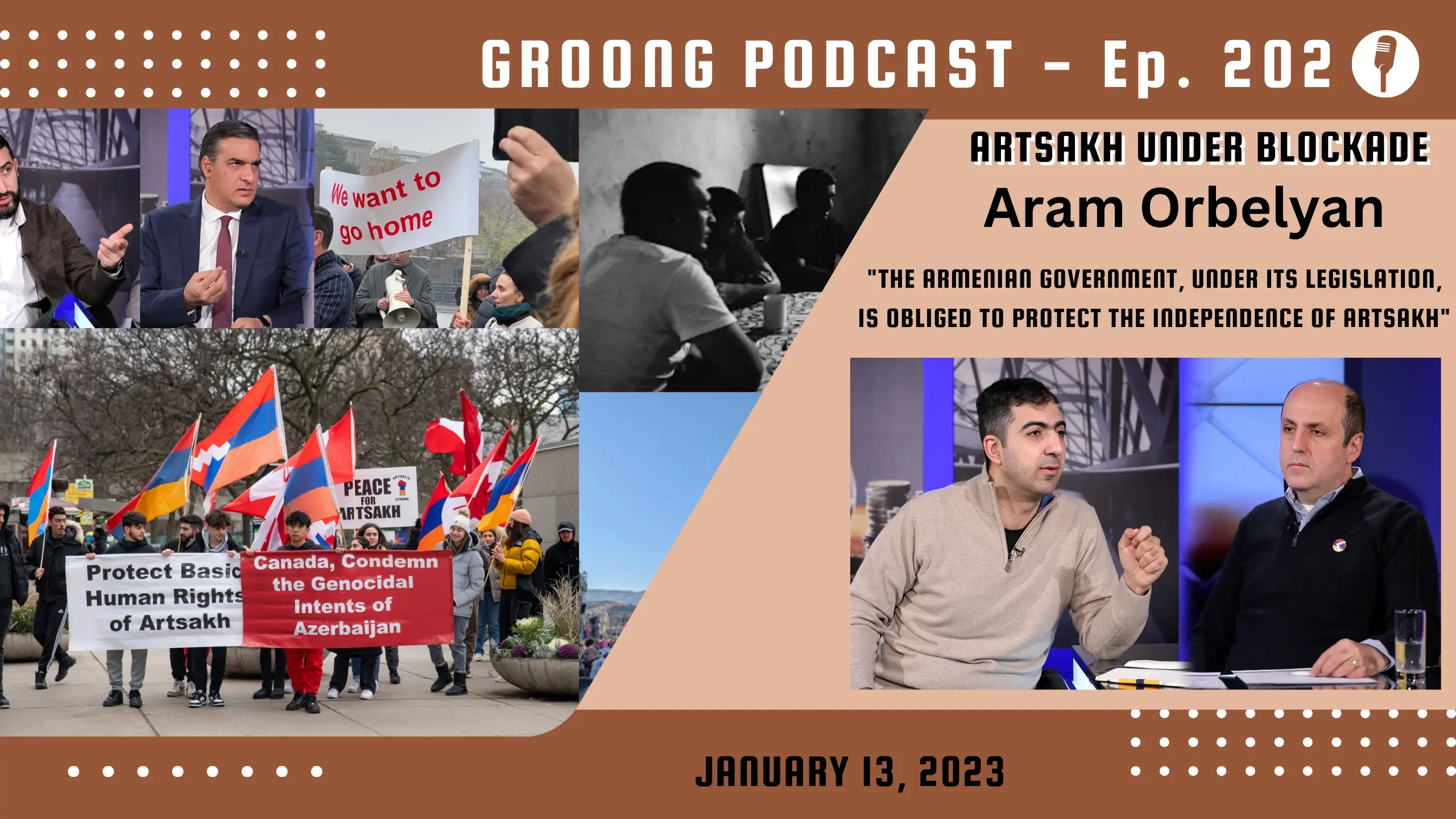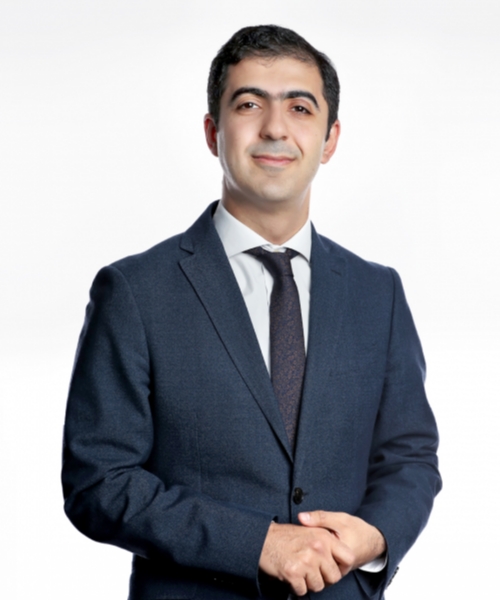
Guests:
- Aram Orbelyan, international law specialist, who is an attorney and managing partner at Concern Dialog law firm, and PhD in Public international law. Mr. Orbelyan lectures at the Academy of Advocates of the Republic of Armenia, and lectured public international law at French University of Armenia. Mr. Orbelyan was Deputy Minister of Justice of Armenia between 2011 and 2014.
“The Armenian government, under its legislation, is obliged to protect the independence of Artsakh” - Aram Orbelyan
Topic:
As of earlier this week, Artsakh has introduced coupons to ration food. Other critical supplies are also hard to find.
To add to the issues faced by Artsakhtsis, there are reports of a damaged high voltage electricity cable, whose repair is being prevented by Azerbaijan, resulting in rolling blackouts all throughout Artsakh.
And yesterday, the only fiber optic cable to Artsakh was cut at the same location where the pseudo eco-activists are. Access to repair the cable is not being granted.
Outside of a few muffled statements, the indifferent world watches on.
Today’s episode is a collaborative effort with “168 Hours” in an effort to increase the amount of English language content in the midst of this crisis in Artsakh, which has entered its 33rd day.
Links:
- 168 Hours: https://168.am
- Groong: https://podcasts.groong.org
Episode 202 | Recorded: January 13, 2023
Show Notes
Discussion
We have a number of additional questions for you so thank you for giving us your time again.
Azerbaijan’s Legal Basis
Ever since this blockade started a number of world governments and international organizations have called on Azerbaijan to unblock the Berdzor corridor. Yet, so far all these calls are on deaf ears.
- What legal basis does Azerbaijan’s basis of establishing a control checkpoint on the Berdzor corridor have?
- How do Azerbaijan’s actions relate to the Nov. 9th document?
Is It Genocide?
A number of organizations worldwide have warned about the risk of genocide in Artsakh. The Lemkin Institute for Genocide Prevention has so far issued 5 updates for its “Red Flag Alert” on Artsakh, calling both the separation of Artsakh from Armenia and the act of isolating and terrorizing ethnic Armenians residing in Artsakh, as implementation of “genocidal policies in the region”.
Questions:
- To help disambiguate this topic, can you tell us what the difference is between war crimes, ethnic cleansing and genocide?
- Do you believe that the activities of Azerbaijan fit the definition of genocide?
The other day I was trying to explain the situation to an american friend of mine and he seemed concerned when I used the word genocide. The response I got was: “if its an ongoing genocide, then why aren’t people dying? Also, if its a genocide, then why aren’t the western media writing about it?”
- Are we devaluing the word genocide by using it in this context, especially as Armenians, whose 1.5 million brethren perished in 1915?
Armenia’s Role
The Armenian authorities place the entire responsibility for unblocking the Berdzor-Lachin corridor on the Russian peacekeeping contingent.
Questions:
- What do you think is the role of the Armenian government in securing the safety of 120,000 of our compatriots in Artsakh? Are they considered citizens of Armenia?
The Armenian declaration of independence, which is an inseparable part of the Constitution, makes a reference to the “December 1, 1989, joint decision of the Armenian SSR Supreme Council and the Artsakh National Council on the “Reunification of the Armenian SSR and the Mountainous Region of Karabakh”
In essence Armenia has recognized Artsakh as part of the Republic of Armenia. In fact, we know that until 1995 there were elected parliamentarians in the national assembly representing Artsakh.
- What obligations does Armenia have in relation to this blockade, considering the preamble to the constitution?
- What tools does Armenia have in its toolset that haven’t been used yet?
ECHR
Armenia as a member of the Council of Europe is also a member of the European Convention on Human rights. So is Azerbaijan.
At the start of the blockade, Armenia had applied to the European Court of Human Rights requesting interim measures, and the ECHR approved the request partially.
The ECHR called on Azerbaijan to “take all measures that are within their jurisdiction to ensure safe passage through the ‘Lachin Corridor’ of seriously ill persons in need of medical treatment in Armenia and others who were stranded on the road without shelter or means of subsistence.”
Question:
- Was this narrow decision a victory for Armenia? Isn’t that too specific, targeting only seriously ill people and those who were stranded on the road? How about resumption of supplies? How about the free passage of all people?
- We know that during the 44-day war, Azerbaijan ignored the ECHR’s interim measure? In case of non-compliance, can sanctions be applied, and what kind of sanctions can they be? Who would apply them?
Power of Announcements
In the last 2 years, the three signatories of the Nov 9-10 statement, Armenia, Russia, and Azerbaijan, have made numerous declarations starting from The Statement, and subsequent declarations that use it as a basis.
Questions:
- What legal value or power do such declarations have, especially considering Armenia’s constitution? Are they mere declarations or can they have binding power?
- Why are so many international partners expressing support for the Nov. 9-10 deal and hoping that peace will be signed based on that document, when it is clear that Azerbaijan is applying the use of force or the threat of use of force at every step?
We keep hearing the leader of Azerbaijan threatening Armenians of Artsakh, while issues more and more claims about opening corridors by force, and etcetera. Pashinyan has since then issued multiple additional statements, including the one in Prague where Pashinyan is reported to have completely washed his hands of Artsakh. Meanwhile, Armenian POWs are still in Baku.
Questions:
- Could those statements, singed under constant threats and human rights abuses, be considered to be signed under duress? Could they be considered legally invalid?
- Is the principle of the non-use of force, which is part of the Helsinki Final Act, dead? Why was Azerbaijan not punished for violating these principles?
Wrap-up
All right, that’s our show, we hope you found that useful. Please find us on Social Media and follow us everywhere you get your Armenian news, the links are in the show notes. Thanks to Laura Osborn for the music on our podcasts. We’ll talk to you soon!
Guests

Aram Orbelyan
Aram Orbelyan is an international law specialist, who is an attorney and managing partner at Concern Dialog law firm, and PhD in Public international law. Mr. Orbelyan lectures at the Academy of Advocates of the Republic of Armenia, and lectured public international law at French University of Armenia. Mr. Orbelyan was Deputy Minister of Justice of Armenia between 2011 and 2014.
Hosts

Hovik Manucharyan
Hovik Manucharyan is an information security engineer who moved from Seattle to Armenia in 2022. He co-founded the ANN/Groong podcast in 2020 and has been a contributor to Groong News since the late 1990s.
Disclaimer: The views expressed by Hovik Manucharyan on the ANN/Groong podcast are his own and do not necessarily reflect the opinions of his employer or any other organization.